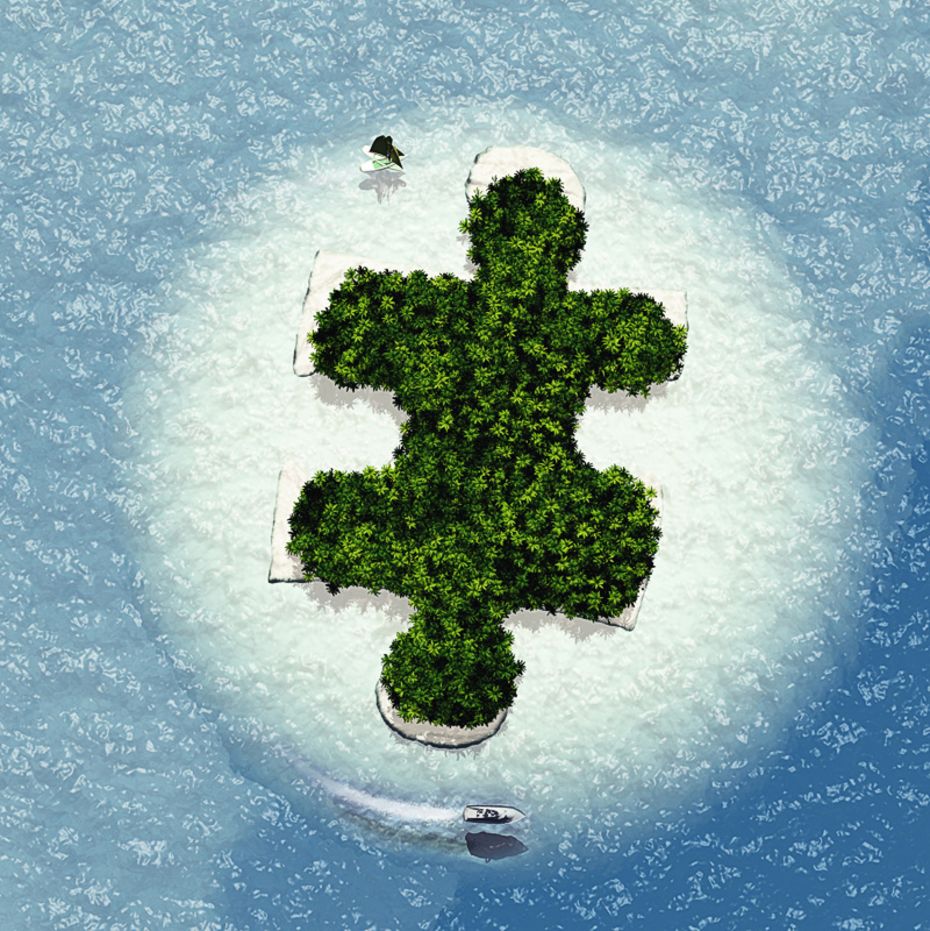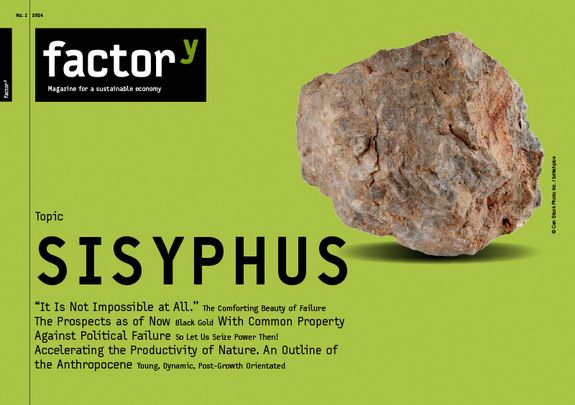Sisyphus

As the frustration over the dominant economic system increases, new ideas and alternatives arise as well. As general welfare is worth more than money, a counterculture finds new solutions to lead a good life. Decentralized and well-networked, these islands could become a continent.
By Annette Jensen and Ute Scheub
Translated from the German by Yvette Gossel, Vanessa Kammerer, Zarina Brückner
Alex Shure provides all his inventions as open source on the Internet. There is, for example, a handy wooden cube: depending on which side is facing, lamps can be dimmed or the volume of music can be turned up. The electronics inside of it is invisible and even Alex Shure’s two-year old godchild figured out how to use it. However, this is more than playing: such cubes could substitute for many power supply lines in new apartments. Even the operation of Shure’s workshop in his garage in Siegen is innovative. The current efficiency of the photovoltaic systems installed on its roof is stored in a battery and provides the electricity for LED lights and the CNC milling machine. The construction makes the transformation of direct current to alternating current and back again unnecessary and thereby prevents energy loss. On top of this, no transformers between the socket and device are needed anymore; saving copper wire and other resources.
Whoever wishes to do so can reconstruct Alex Shure’s inventions, adjust them to their needs or further develop them – but only if these plans are also being uploaded subsequently and are accessible for fr
Possession is not a requirement
From the point of view of traditional economists, Alex Shure behaves in an unnatural way: he publishes ideas and blueprints with which he could have made a lot of money, but that is not what matters to the 27-year old. He does not feel like dealing with competition and career, but instead prefers living in a networking global community of mutual support. Currently, he is staying in Berlin at the apartment of a friend who is travelling at the moment. He eats at the Nowhere Kitchen in the municipal district of Neukölln where people prepare delicious meals with the ingredients they have at hand.
Given that new economic systems conform to the old logic of quantification and growth; they had remained beneath the radar screen of the traditional economy for a long time. By now, however, they are developing at an impressive pace and proliferating into the mainstream.
On the Internet, free software and hardware can be downloaded easily. In addition, renting, exchanging and sharing everyday items attract more and more young and highly educated individuals in larger cities. This goes back to the notion that possession is not a requirement anymore in order to use items. With a smartphone or laptop you can find out within seconds if someone close to you owns a projector or a fondue pot, things you might need only once in a while.
Many young people associate owning a car more with traffic jams and a lack of parking spaces than with a sense of freedom – hence many prefer to rent a car for those few occasions when they really need one.
Exchange platforms on the internet make this connection between individuals possible. The reputation system is important for establishing the dearly needed trust on these platforms: if you are not reliable, return a grill that is still greasy or make offensive jokes, you will have to be prepared for negative comments and will thus have little chance to lend or borrow anything in future.
Good Connections Make Sharing Easier
The powers behind this new movement are neither ecological nor moral motives, but the desire to lead a good life. According to international happiness research, gaining more and more money is absolutely irrelevant for the well-being of people living in rich countries. At the same time, there is ample evidence that growing inequality results in a dysfunctional and dissatisfied society. Not even those who are at the top of such societies feel any better. What is the purpose of a practice which leads to global warming, the massive extinction of species and the poisoning of humans, animals and plants alike?
On many different levels and in many countries, businesses and projects based on values such as fairness and communality have developed in recent years. These projects range from community supported agriculture, which means that the work and not the product of a farmer is financed, over urban community gardens to energy cooperatives. In addition, DIY repair shops as well as new forms of car sharing developed.
Two technical developments help tremendously to spread such projects, namely renewable energies and the Internet. Both are decentralised from a structural point of view and thus have the potential to put forward alternatives to the prevailing large-scale structures. The internet enables the global exchange of ideas and is also an excellent tool for small, local networks of peers. The fact that those initiatives are so attractive results from the vivid idea that there is an alternative to a world dominated by material constraints and major corporations.
Supporting Instead of Demanding
However, the projects and initiatives that develop all over the world have no intention to attack capitalism and its dogma of economic growth. They do not even refer to it but rampantly grow according to their own values and desires instead. They inspire and support each other, become increasingly numerous and diverse, and the bigger the network, the faster it develops. An explosion of such projects has been observed in Berlin over the past two years.
Many projects start out very small: You do not have to change your entire life to contribute. However, one often notices during the first few steps that it is more fun to meet people at eye level than to feel exposed to a global corporation that expects its customers to wait for hours on a hotline. Here, it is all about real encounters with people instead of staged shopping experiences.
Why should it not be possible that an entire continent grows out of such more or less merry islands? In any case, it is obvious that the current political and economic system is delegitimising itself more and more and is thus becoming morally hollow. After a quarter of a century of climate diplomacy, we have not succeeded in reducing the annual CO2 emissions and the consumption of rare resources is growing rapidly. Today the real economy stands at USD 65trn, while at the same time ‘financial products’ amount to a total of USD 600trn. The next bubble will surely burst. We cannot continue like this over the medium term.
It will also depend on the governmental framework conditions whether decentralised, small structures that are made up of even smaller units will become generally accepted and whether common property will take off. Until now, nearly all governments commit themselves to the dogma of economic growth and declare that problems can only be solved if the gross domestic product rises continuously. So far, politics have failed as the leading force for eco-social change. The hope remains that politicians will recognise what chances lie in supporting these new structures.
Annette Jensen and Ute Scheub are the authors of the book Glücksökonomie – wer teilt, hat mehr vom Leben (happiness economy – if you share you get more out of life), which was published by the publishing house oekom at the end of August 2014. In factory Wish-For-Happiness Annette Jensen wrote the article Unternehmer im Glück (initiative instead of frustration) and in factory S/he Ute Scheub wrote Weiberwirtschaft (women’s economy).
More articles on the topic of frustration & failure and sustainability are either online or in our factory Magazine Sisyphus. Fine illustrated and good readable on tablet computers and screens the PDF magazine contains all articles and pictures with numbers and citations to topic and is free to download.
Themen
- The Domino Effect: the Mobility Transition as an Engine for the ‘Great Transformation’
- Cities Use the Space
- Decarbonization by 2030
- The fear of biting the hand that feeds you
- Where investing is a pleasure
- Why divestment is going to change the world
- A Robin Hood tax for climate protection
- May the Force Be with Us
- Modern Strategies
- The prerogative of interpreting the future now lies with the companies involved in climate protection”
- From Negotiating to Trading Equitably
- Can a donkey be tragic?
- Rethink rather than rebound: a sufficiency revolution must precede the efficiency revolution
- On Rebound, Prebound and Performance Gaps
- So Let Us Seize Power Then!
- With Common Property Against Political Failure
- So Let Us Seize Power Then!
- The Comforting Beauty of Failure
- “It Is Not Impossible at All.“
- Resource-light shopping
- Men Have Not Stopped Giving the Advantage to Women – So Far
- Toothpaste for Princesses and Soup for Pirates
- It is about equality
- A nice day
- Initiative instead of frustration
- The right ingredients
- Resilient for Life
- Not only, but also
- Appreciation – more please!
- Worth more than money
- Learning to value the value of goods
- Worth and Values
- The Transformative Power of Science
- Historically effective: How innovation and technology transform
- The Disappearance of Products
- Growing Older 101
- Columbus’ Egg
- It Works! In Theory at Least ...
- What If...?
- Analysing Separately – Thinking and Acting Together!
- Let’s Break Away from Determined Breaking Points
- More Gold in Waste than in Mines
- The art of separation
- Should you really DIY?
- The Aesthetics of Do-It-Yourself
- Standing on One’s Own Feet
- From the handaxe to desktop fabrication
- Using Shares to Survive the Crisis
- When Citizens participate
- Possess to Participate
- The Right Growth at the Right Time
- Gunter Pauli and Blue Economy
- When Sustainability Grows
- How we treat Growth
- Illusions about Growth


